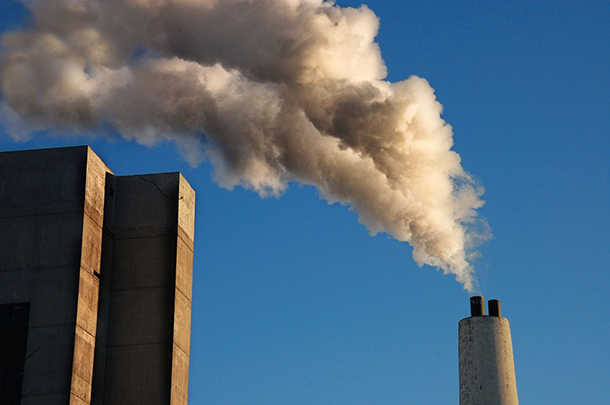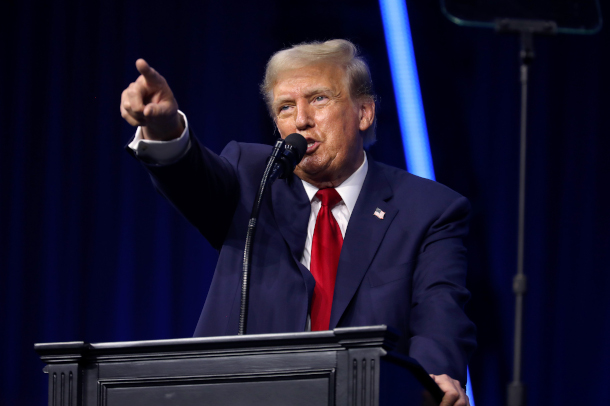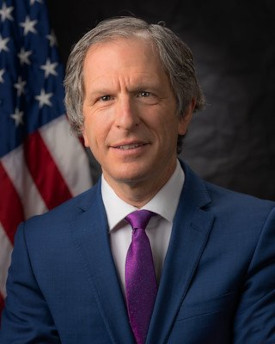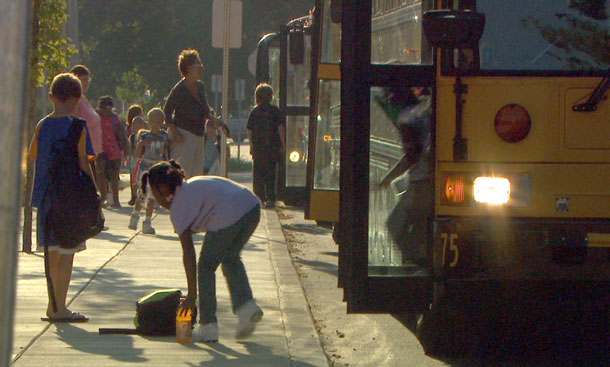Trump Ignores Social Cost of Carbon
Air Date: Week of May 23, 2025

The social cost of carbon (SCC) refers to the net damages from global climate change that result from an increase in CO2 emissions of one metric ton. (Photo: Ryan T, Flickr CC BY-NC-ND 2.0)
A new White House memo instructs federal agencies to disregard the economic impacts of climate change in their regulations and permitting decisions. This metric is known as the “social cost of carbon” and it has been used for decades to guide policy so that it considers the economic realities of our changing climate. David Cash served under President Biden as the New England Administrator for the US Environmental Protection Agency and he joins Host Jenni Doering to discuss.
Transcript
O’NEILL: It’s Living on Earth, I’m Aynsley O’Neill.
DOERING: And I’m Jenni Doering.
A new White House memo instructs federal agencies to disregard the economic impacts of climate change in their regulations and permitting decisions, unless explicitly required by law. This metric is known as the “social cost of carbon” and it has been used for decades as a way to guide policy so that it takes into account the economic realities of our changing climate. Even in the first Trump administration, the White House used the metric, though they put it only around $5 a ton at the time, far lower than the Obama Administration estimate of $42 a ton. In the Biden White House, a recalculation factored in inflation and the worsening toll of climate change, bumping up the cost to nearly two hundred dollars per ton. David Cash served under President Biden as the New England Administrator for the US Environmental Protection Agency, and he joins us now to explain what a “social cost of carbon” of zero would mean. David, welcome back to Living on Earth!
CASH: Thanks, Jenni, good to be here.
DOERING: So, let’s start by breaking down what the phrase means, the social cost of carbon. What is this all about?
CASH: Yeah, so this is a little bit on the wonky side of things, but really, really important and very different than a lot of the other things that we've seen this administration doing in turning back the climate clock in terms of freezing federal funding and changing regulations. Social cost of carbon means, basically, if we don't stop climate change, what are the costs that we all feel because of climate change? In other words, what are the costs because of the increased chance of wildfires or coastal flooding or drought. Because, when government regulates industry polluters for doing things, government has to justify taking actions right, and that justification is based on what happens if industry is not regulated, right? Government doesn't want to regulate industry just because it's fun to regulate industry. We regulate industry to protect people, because industry will take action sometimes that doesn't take into account the cost of their doing business, and what that cost has on people. So the social cost of carbon is something that's been developed over the last 15/20 years that very methodically and very robustly, uses science, economics to determine what that impact would be, so that when the government makes a regulation the benefits in terms of the reduction of harm, the reduction of costs, has to outweigh what it's going to cost industry, for example, to change technology or to reduce emissions. And what's so in some ways outrageous about the latest efforts that the White House is taking is essentially saying there's no cost of climate change. Climate change doesn't exist, and therefore we don't need to take it into account when we're taking regulations. And what that will mean is greater droughts, greater wildfires, loss of life, injuries, all of those kinds of things that are part and parcel of the climate crisis that we're facing,
DOERING: Right, I mean, just ignoring what's happening doesn't make the problem go away.
CASH: Not at all. I have a quick little metaphor that maybe can help people understand. In the 1960s and 70s, it became more and more obvious that if you drove a car without seatbelts and you got into an accident, much more likely to get hurt, to have injuries, to have deaths, and there was a large cost to a car company not putting in seatbelts. Of course, there was a cost to the company to add the seatbelts. It costs money. It would cost the consumer money. But the government did the analysis, and it showed that actually it was incredibly cheap to put in these seatbelts, and the benefits were huge, the reduction of injuries and costs, and even to like local municipalities, for their police departments or fire departments emergency responders, all of those costs would go down. And so that's exactly what the role of regulation should be is to protect the public from actions that industry takes that they don't put in their bottom line, and the regulations force them to put in their bottom line, and that's exactly what we're trying to do with climate change.
DOERING: So let's talk about the numbers. You know, the Trump administration is looking to bring this cost to zero. What do our best estimates say that the cost actually is in comparison?
CASH: Well, in the Biden administration, it was up to $190 per ton. So what that means is that, on average, if a ton of carbon dioxide is released into the atmosphere through cars or through a power plant, it would cost about 190 dollars in terms of damage. Now you could see how that could, 190 dollars, could add up pretty quickly, right? Analysis from the National Oceanic and Atmospheric Administration last year showed impacts of at least 180 billion dollars and that's taking into account the impacts of floods and drought and wildfires and things like that. So that's what the cost of carbon is supposed to capture. What the incremental cost of each additional ton of carbon in the atmosphere will result in that you're going to have to pay for if you go to the hospital that people out in California paid for because they don't have homes anymore. And by the way, industries all over the country are taking this into account. Insurance, you might have read in the news how insurance is much, much harder to get now in California and Florida and other places that are hit by climate change really hard, and that's because the insurance companies have to take into account those costs. They're real. So for the White House to be saying, oh, they're not real, climate change is not real, it doesn't cost anything is outrageous.

President Trump’s White House has instructed federal agencies to disregard climate change on a number of levels. (Photo: Gage Skidmore, Flickr, CC BY-SA 2.0)
DOERING: You know, the Trump Administration has said there's just so much uncertainty in how much carbon dioxide costs society that it's not even worth counting that cost. What's your response?
CASH: There's always uncertainty. Of course, there's uncertainty. This is a dynamic, changing landscape, and our understanding changes. Of course, there's uncertainty, but if government never made decisions because there was uncertainty, government would never make decisions because there's always uncertainty. So the key is in wise governance is how you take into account those uncertainties. When you make your decisions, you acknowledge them, and then you invest in science to reduce those uncertainties. But guess what the White House is also doing… It's reducing its investment in the National Oceanic and Atmospheric Administration's science. It's getting rid of EPA’s science efforts to study climate change. So, of course, uncertainties will not be diminished given the work that they're doing. In fact, they're even reducing things like hurricane forecasting. I mean, states and municipalities all over this country use those forecasts to prepare for the next big hit. The Trump Administration is taking away that information as well.
DOERING: And so David, what might a social cost of carbon of zero mean in the real world when it comes to projects that the federal government is considering.

Some experts have calculated the financial impact from climate-worsened disasters in the U.S. to be around $180 billion in 2024 alone. (Photo: Daniel Lincoln, Unsplash)
CASH: Yeah. So basically what it would mean, it would allow the EPA, for example, to diminish the effectiveness of regulations such that cars could pollute more, factories could pollute more. Gas plants, coal plants could produce more. All of which would increase the chance of greater storms, greater flooding, greater wildfires, greater drought, greater incidence of incredibly hot days in the summer where people will get more cases of asthma, more respiratory disease, all of those kinds of things. So it will have a real world impact. And you know, let's say they do that, and a year from now, you could go into hospitals and see an uptick in asthma rates, for example, on emergency room visits, which, by the way, you may recall, I live in New England, and about a year or so ago we had the wildfires that were sending smoke from Canada to the Boston area. In all of New England, we saw an uptick of emergency room asthma cases, kids coming in because of that… well, so we'll see more of that.
DOERING: Yeah, I mean that deadly particulate matter kills something like 300,000 people in the US alone every year. According to the World Health Organization, it's coming from wildfires, it's coming from smokestacks, tailpipes. To what extent does the social cost of carbon or another metric capture that societal toll?

David Cash is the former Administrator of EPA's Region 1, New England. (Photo: Courtesy of the EPA)
CASH: When EPA regulates, it takes into account all of the different pollutants, and so particulates is one of the most important because it has such an on-the-ground impact to people's ability to breathe, and so regulations do capture that. And at this point, this particular memo from the White House that said it was going to count the social cost of carbon as zero does not impact analyses at this point of particulates, but we know that that's coming. We know there's going to be relaxing of using the kinds of standards that protect people's health and protect the ecosystems upon which we all depend.
DOERING: David, what do you think people need to keep in mind when they hear a story like this coming out of the current federal government?

In addition to the financial cost of carbon pollution, particulate matter from emissions also takes a toll on public health, especially for vulnerable populations. (Photo: Indiana Public Media, Flickr, CC BY-NC 2.0)
CASH: I think they have to figure out how to speak out, how to speak out when they hear news like this, and then understand that what this administration is doing is making their environment not as safe for them, and that will have an impact on their family, that will have an impact on their community, that will have an impact on their farms. By the way, a kind of interesting sidebar is that when the US Department of Agriculture announced that they were going to cut their climate forecasting, farming associations got very concerned and complained a lot about it, so that they reinstated them. So we all have to be vigilant to protect the science and the wonky regulatory things like social cost of carbon, we have to protect those so that our families are protected.
DOERING: David Cash is the former US Environmental Protection Agency Administrator for New England. Thanks so much for joining us, and we'll talk to you again soon.
CASH: Great, thanks, Jenni.
Links
The New York Times | "What’s the Cost to Society of Pollution? Trump Says Zero."
Legacy EPA info about the Social Cost of Carbon
Watch an explainer from Resources for the Future about the Social Cost of Carbon
Living on Earth wants to hear from you!
Living on Earth
62 Calef Highway, Suite 212
Lee, NH 03861
Telephone: 617-287-4121
E-mail: comments@loe.org
Newsletter [Click here]
Donate to Living on Earth!
Living on Earth is an independent media program and relies entirely on contributions from listeners and institutions supporting public service. Please donate now to preserve an independent environmental voice.
NewsletterLiving on Earth offers a weekly delivery of the show's rundown to your mailbox. Sign up for our newsletter today!
 Sailors For The Sea: Be the change you want to sea.
Sailors For The Sea: Be the change you want to sea.
 The Grantham Foundation for the Protection of the Environment: Committed to protecting and improving the health of the global environment.
The Grantham Foundation for the Protection of the Environment: Committed to protecting and improving the health of the global environment.
 Contribute to Living on Earth and receive, as our gift to you, an archival print of one of Mark Seth Lender's extraordinary wildlife photographs. Follow the link to see Mark's current collection of photographs.
Contribute to Living on Earth and receive, as our gift to you, an archival print of one of Mark Seth Lender's extraordinary wildlife photographs. Follow the link to see Mark's current collection of photographs.
 Buy a signed copy of Mark Seth Lender's book Smeagull the Seagull & support Living on Earth
Buy a signed copy of Mark Seth Lender's book Smeagull the Seagull & support Living on Earth

